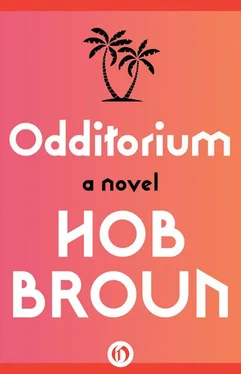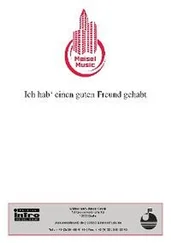Lucien celebrated his fourteenth birthday by stealing fifty dollars from his mother’s sewing box — money earned repairing fishermen’s nets and earmarked for an eventual pilgrimage to Lourdes — and hopped a bus to Ottawa. For the next two years he bummed around southern Ontario, working when he could, camping in hobo jungles when he could not.
In 1927, in the company of a tramp known only as Stalebread, Lucien traveled to America by boxcar, a move that was to ineluctably alter the direction of his life. In the suburban community of Royal Oak, outside Detroit, he and Stalebread were yanked from the train by bulls in the pay of the Great Northern Railway and walloped with wooden batons. In their jail cell late that night, Stalebread succumbed to the effects of the beating. Lucien saw the spirit leave his partner’s body, a billowing acid green nimbus that told him in an echoing voice of the martyrdom of Saint Jude, clubbed to death for his fidelity to Jesus Christ. When the guards came to remove the corpse, Lucien requested a Bible.
By the time of his release, he had read the Book from cover to cover three times. Exulting in his new faith, but stunned and somewhat frightened by the swiftness of its conquering rush, Lucien wandered the streets for days, eating out of garbage cans and awaiting a sign of God’s will. It came in the form of a painful kick delivered by one August Hansen, in whose coal bin Lucien was sleeping shielded from a heavy rain. But in an instant Hansen had relented, taking pity on this forlorn boy, offering room and board in return for which Lucien would go to work for him as an apprentice plasterer.
The first time Lucien went on a job by himself he was sent to make some minor repairs at a local radio station. In a cramped, primitive studio with blankets hung on the walls as soundproofing, he met a small, intense priest whose weekly broadcast was the most popular thing on the station. His name was Charles E. Coughlin. Lucien felt an electric charge flow through him as they shook hands. Bolts of fire burst from Coughlin’s eyes and danced around the steel rims of his glasses. It was the sign Lucien had been waiting for.
When Coughlin (born in Hamilton, Ontario) found out that Lucien was a fellow Canadian, he invited him to attend services at his church. Lucien was completely devastated by that first visit to the Shrine of the Little Flower and became a fiercely loyal parishioner, taking the host as often as five and six times a week. But it was the sermons he came to hear, fidgeting impatiently through the drone of the liturgy, hoping to be once more dazzled by one of Coughlin’s booming orations. He was an angry wind in the pulpit.
Up until that time Lucien’s political awareness had been confined to the hatred of the English his father had taught him, a vague desire to avenge the French loss of Quebec at the Plains of Abraham. But now Coughlin opened his eyes to the foul machinations of the Bolshevik Antichrist, a specter that could be traced back to 1776 when a Bavarian called Adam Weishaupt had founded a cult known as the Illuminati, based on principles expounded by medieval rabbis and cabalists. The French Revolution, Coughlin taught, was instigated and controlled by Weishaupt. Marx and Engels had been no more than Illuminati puppets. World affairs were being currently directed by Illuminati bankers in New York and London in collaboration with the Jew commissars in Moscow; and the day would soon arrive when these despotic stewards of Satan would be able to dictate their vile and ghastly terms to every man, woman and child on the planet.
The breadth and enormity of this secret design filled Lucien with terror. It transcended all boundaries, negated all hopes and ambitions. What chance could there be to defeat the Red Serpent when the world’s leaders refused even to recognize it?
Lucien left August Hansen, took a room in a flophouse and a part-time job sweeping out the radio station. In order to cleanse himself, he stopped eating, ingesting only fruit salts dissolved in rain water. He conducted all-night prayer vigils in a field behind the municipal car barn, invoking obscure saints and rolling naked in the mud. The weaker he became physically, the stronger was his mental resolve, the greater the inspiration of inner righteousness. On a Sunday just before dawn, weighing one hundred twelve pounds, he rose from aching knees a staunch and fearless soldier in the army of the Lord. He was ready now, ready to battle the Red Serpent until his final breath.
No one was more ravaged when, in 1931, Coughlin’s national network hookup was canceled by the Columbia Broadcasting System. In fact, Lucien was so crushed by this Zionist treachery that he left Royal Oak behind, drifting down to Ville Platte, recreating in his own small way the original Acadian migration. But he took with him a personal letter from Father Coughlin appointing him a recruiter for the National Union for Social Justice, the political party Coughlin had formed in alliance with Gerald L. K. Smith and Huey Long, the senator from Louisiana. Frustrated in his efforts to meet with Long at his Baton Rouge compound, unable to enroll a single member in the party (he was a dreadful speaker and had an innate distrust of strangers), Lucien went to work in a pencil factory, milling graphite, and passed into a friendless and fixated bachelorhood.
During the wicked dementia of the World War, in which he served as a stateside file clerk (receiving an ordinary discharge after one too many efforts to convince his superiors they should leave Hitler alone and get after Stalin), and the silencing of Coughlin by the nabobs of Rome, suggesting as it did Illuminati infiltration of Mother Church — through all of this, Lucien somehow managed to abide. The ensuing years saw many setbacks, the Beast moving ever forward, capturing new territory and new souls, but Lucien’s flame burned on. He never lost hope. The day would come — perhaps not in his lifetime, but it would come — when the tide would be reversed and there would be much work for His fiery sword.
As he rankled into middle age, Lucien determined that he would need an heir to carry on the work. In 1953 he met and married Harlene Diggs, an itinerant gospel singer from Grapeland, Texas, who had grown tired of strumming her way along the Gulf Coast and resolved to hitch up with the first blue-eyed man she met. She bore Lucien a daughter by Caesarian section one year later. Harlene took in washing, Lucien worked double shifts at the pencil factory, and before too long they were able to make a down payment on a small farm just outside of town. They plowed some ground for vegetables, planted fruit trees, and traded a dresser and cedar chest for an old milk cow. There was only one thing wrong: Lucien’s health. He coughed all the time, was short of breath. Down at the clinic, they told him he had chronic bronchitis. In truth, years of inhaling graphite dust had caused degenerative pulmonary fibrosis, but this condition was not to be discovered until much later.
The weather was mild on Christmas Day of 1958 and the Soileau family went on a picnic by a calm, blue lake ringed with pines. Cold chicken, egg salad, bowls of fruit and nuts were laid out on a lacy embroidered sheet spread over the grass. After the meal Harlene played her guitar and they sang “O Little Town of Bethlehem.” Lucien took his daughter for a walk in the woods and made for her a tiny crown out of leaves and plaited twigs.
They returned to find Harlene floating facedown in the water, her skirt fanned out among the reeds, a gingham banner of gall and desolation.
For several months, Lucien did not speak.
“ Pauvre Papa .” Tildy smoothed his eyebrows with the tip of one finger. “You really ought to eat something, but I can’t make you…. Remember how we struggled over the fried eggs in the morning? You would stand over me until I cleaned my plate. Those cold, greasy eggs sitting there and I’d tell you I could not eat them, they were like big yellow eyes. But you would stay and stay. You’d be late for work and I’d be late for school, but nobody moved until I choked those eggs down. Do you remember that, Papa?”
Читать дальше












